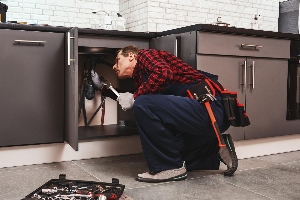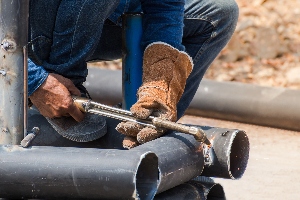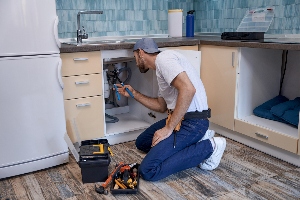When your water heater fails, it disrupts not just your daily routine but also the comfort of your home. A malfunction can range from a lack of hot water to a full-blown leak, presenting not only an inconvenience but also potential property damage. Recognizing the urgency of such situations, professional plumbing services offer emergency repair solutions tailored to restore your hot water supply promptly and efficiently.
Selecting the right service for emergency water heater repair is crucial. You'll want a provider that is responsive and available round-the-clock to address your urgent needs. Many plumbing and repair services have 24-hour hotlines and promise same-day repairs to minimize the disruption to your household. Whether your water heater is conventional or tankless, gas or electric, experts are equipped to handle the diagnostics and repairs necessary to get your system back in working order.
The reassurance of professional expertise means that, in the event of a water heater emergency, you can expect quality service and swift solutions. Expert technicians come with years of experience and are prepared to offer advice on whether a repair or a full system replacement is more cost-effective, depending on the condition and age of your water heater. With a reliable service, you can ensure that your hot water will be running again with minimal delay.
Identifying Common Water Heater Issues
When your water heater starts malfunctioning, it’s essential to quickly identify the problem. Recognizing the signs of leaks, unusual noises, and inconsistent water temperatures is crucial for timely repairs.
Leaks and Drips
Identification: Check around the base of your water heater and the connected pipes for water pooling or signs of moisture. Regularly inspect the drain valve and ensure it's not the source of the leak.
- Connection Leaks: Often found at the inlet and outlet connections. Tighten them if loose.
- Tank Leaks: Can indicate tank corrosion. A replacement may be necessary.
- Valve Leaks: May stem from a faulty temperature and pressure relief valve or a worn-out drain valve.
Unusual Noises
Identification: Be alert to sounds coming from your water heater such as popping, rumbling, or banging noises. These can signify various issues.
- Sediment Build-up: Can lead to noise as water boils beneath the sediment.
- Component Issues: Malfunctioning heating elements can create noise.
- Water Flow Obstruction: Can cause noise as water forces its way through the obstruction.
Inconsistent Water Temperature
Identification: Note any sudden changes in water temperature during use. Fluctuations are not normal and indicate potential problems.
- Thermostat: Check if it is faulty or incorrectly set.
- Heating Elements: In electric water heaters, failing heating elements can result in temperature inconsistency.
- Gas Supply: For gas heaters, problems with the gas supply or pilot light can affect temperature stability.
Emergency Repair Protocols
In the event of a water heater emergency, your immediate goals are to prevent damage and maintain safety. Here's how to handle the situation effectively.
Power and Gas Shutdown
Safety First: Before addressing any leaks or damage, it's crucial to shut off the power supply to your water heater. If you have an electric water heater, locate your circuit breaker panel and flip the switch labeled for the water heating system to the "off" position.
For those with gas water heaters, you will find a dedicated gas shut-off valve near the water heater. Turn this valve to the "off" position to halt the flow of gas. This will prevent any gas leaks or potential fires while you deal with the emergency.
Temporary Water Heating Solutions
After ensuring safety by shutting down power or gas, you might need a stopgap for hot water. There are several temporary solutions to consider:
- Boiling Water: Boil water on your stove or use an electric kettle to provide small amounts for urgent needs.
- Portable Heaters: Consider using portable water heaters or heat-pump technology for a short-term fix.
- Neighborhood Facilities: Utilize facilities such as a community center or gym for showering if available.
Remember, these solutions are temporary. Contact a licensed professional to safely restore your hot water heater to proper working order.
Scheduling and Preparing for Professional Repair
When your water heater fails, you need to quickly arrange for professional repair service to restore your hot water supply efficiently. Selecting a licensed plumber and understanding the repair process are critical steps you shouldn't overlook.
Choosing a Licensed Plumber
Locating a licensed plumber with expertise in water heater repairs is the foundation of effective service. Ensure that the plumber you choose has a track record of reliable performance by checking reviews and verifying their credentials. Booking services from trusted professionals, such as those at One Call Plumbing, gives you confidence that your water heater repair is in good hands.
- Look for licensed and insured plumbing experts.
- Confirm their experience with your type of water heater.
- Check customer testimonials to gauge satisfaction.
What to Expect During Repair
Once your plumbing professional arrives, you can expect them to inspect the water heater thoroughly to diagnose the issue. They will check for common problems like:
- Leaks: Identifying where and why leakage occurs.
- Heating element failure: Testing elements or the gas burner.
- Thermostat issues: Ensuring correct operation and settings.
After pinpointing the problem, they will explain the necessary repairs and provide an estimate of the cost before proceeding with the fixes. It's important for you to clear the area around the water heater, to allow the plumber adequate space to work. Any valuables or fragile items should be moved to prevent accidental damage.
During repair, your plumber may replace faulty components, address pressure relief valve issues, or fix leaks. Interruption of water and possibly power service is typical, so plan accordingly. Upon completion, the plumber will test the water heater to verify that it operates without faults and complies with safety standards.












